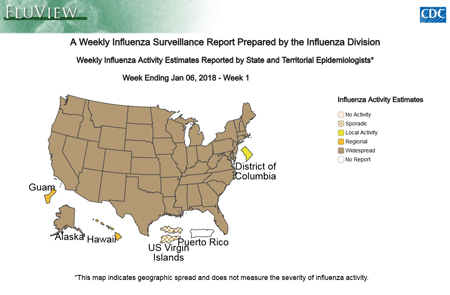 This year’s flu season is shaping up to be much more serious than your usual aches and pains. States like Ohio, New Jersey and California have been hit hard. State health officials in Ohio said nearly 2,100 people have been hospitalized because of the flu, which is a dramatic increase from the 369 hospitalizations around this time during the 2016-2017 flu season. Health officials in New Jersey said many residents are dealing with the worst flu outbreak to hit the Garden State in years. And in California, the flu is so widespread that some hospitals have set up triage tents outside their facilities to treat flu sufferers and prevent illnesses from spreading. The effects of the flu are being felt throughout the entire country and it is impacting all types of businesses, large and small.
This year’s flu season is shaping up to be much more serious than your usual aches and pains. States like Ohio, New Jersey and California have been hit hard. State health officials in Ohio said nearly 2,100 people have been hospitalized because of the flu, which is a dramatic increase from the 369 hospitalizations around this time during the 2016-2017 flu season. Health officials in New Jersey said many residents are dealing with the worst flu outbreak to hit the Garden State in years. And in California, the flu is so widespread that some hospitals have set up triage tents outside their facilities to treat flu sufferers and prevent illnesses from spreading. The effects of the flu are being felt throughout the entire country and it is impacting all types of businesses, large and small.
The strain of this year’s virus, known as A (H3N2), is not responding as well to the flu vaccine as health officials had hoped. Earlier this week, health experts met at the U.S. Centers for Disease Control and Prevention (CDC) to provide an update on the current flu activity in the U.S.
Dr. Dan Jernigan, captain, U.S. Public Health Service, and director, Influenza Division, National Center for Immunization and Respiratory Diseases had this to say about the effectiveness of this season’s flu vaccine: “Our information so far suggests that vaccine effectiveness against the predominant H3 viruses will probably be somewhere around what we saw in the 2016-2017 season, which was in the 30 percent range. While this is better than the 10 percent that has been reported from Australia in one study, it still leaves a lot to be desired and we’re very well aware we need to have better flu vaccines.
 “We’re seeing a very active flu season and there are early signs that the season may be severe. Right now, our most important tool for treatment is influenza antiviral medications. Our main tool for ongoing prevention should be flu vaccines, and of course, do not forget to take the everyday common sense behaviors that your mother taught you—stay away from people who are sick, stay home from work or school if you get sick, cover your cough and wash your hands often. These actions can reduce the spread of respiratory illnesses like flu in the community,” he said.
“We’re seeing a very active flu season and there are early signs that the season may be severe. Right now, our most important tool for treatment is influenza antiviral medications. Our main tool for ongoing prevention should be flu vaccines, and of course, do not forget to take the everyday common sense behaviors that your mother taught you—stay away from people who are sick, stay home from work or school if you get sick, cover your cough and wash your hands often. These actions can reduce the spread of respiratory illnesses like flu in the community,” he said.
The flu is particularly dangerous for children under the age of 5, adults over the age of 65 and pregnant women. Numbers from the CDC indicate the virus is widespread in 46 states throughout the U.S. Although the effectiveness of the vaccine is not stellar, the CDC continues to recommend the public gets vaccinated. “It’s important to remember that the flu vaccine is designed to protect against three or four flu viruses, depending on the vaccine,” the CDC said. “For these reasons, even during seasons when there is a less-than-optimal match, the CDC continues to recommend flu vaccination.”
Health officials and the CDC are strongly recommending people who have not been vaccinated should still consider doing so. Flu season lasts from October to May and it takes about two weeks after vaccination for antibodies to develop in the body that protect against flu. While the CDC recommended that people get a flu vaccine by the end of October, getting vaccinated later, however, can still be beneficial and vaccination should continue to be offered throughout the flu season, even into January or later.
In other words, it’s not too late to get the flu shot. Getting vaccinated also protects people around you, including those who are more vulnerable to serious flu illness, like babies and young children, older people and people with certain chronic health conditions, the CDC said.
 So now that you’re armed with all this intel about the 2017-2018 flu season, what can you do to stem the flu tide in your eyecare practice or optical business. While everyone wants to maintain a healthy workplace, “employers need to respect individual employee’s beliefs about flu vaccines,” according to HR Corner editor, Hedley Lawson, Jr.
So now that you’re armed with all this intel about the 2017-2018 flu season, what can you do to stem the flu tide in your eyecare practice or optical business. While everyone wants to maintain a healthy workplace, “employers need to respect individual employee’s beliefs about flu vaccines,” according to HR Corner editor, Hedley Lawson, Jr.
“Both federal and state laws affect what employers can and cannot do. The key is that an employer may not require an employee to receive a vaccination if a sincerely held religious belief, disability or pregnancy prevents the employee from taking the influenza vaccine unless an undue hardship would result. The federal Equal Employment Opportunity Commission’s guidance on the issue is that employers should encourage, but not require, flu shots,” he said.
So, with that as a backdrop, what should you as an employer do? If your company is not in an industry with mandatory vaccination requirements, you should consider encouraging but not requiring vaccination and making it as easy as possible for employees to receive the vaccination. This could include bringing in a health care professional to give flu vaccines at no cost for those who’d like the flu shot or discussing your wellness program with employees.
Here are some facts and figures from the CDC you can share with employees about the advantages of being vaccinated for the flu:
While how well the flu vaccine works can vary, there are many reasons to get a flu vaccine each year.
- Flu vaccination can keep you from getting sick with flu.
- Flu vaccination can reduce the risk of flu-associated hospitalization, including among children and older adults.
- Vaccine effectiveness for the prevention of flu-associated hospitalizations was similar to vaccine effectiveness against flu illness resulting in doctor’s visits in a comparative study published in 2016.
- Flu vaccination is an important preventive tool for people with chronic health conditions.
- Flu vaccination has been associated with lower rates of some cardiac (heart) events among people with heart disease, especially among those who experienced a cardiac event in the past year.
- Flu vaccination also has been associated with reduced hospitalizations among people with diabetes (79 percent) and chronic lung disease (52 percent).
- Vaccination helps protect women during and after pregnancy. Getting vaccinated can also protect a baby after birth from flu. (Mom passes antibodies onto the developing baby during her pregnancy.)
- A study that looked at flu vaccine effectiveness in pregnant women found that vaccination reduced the risk of flu-associated acute respiratory infection by about one half.
- There are studies that show that flu vaccine in a pregnant woman can reduce the risk of flu illness in her baby by up to half. This protective benefit was observed for several months after birth.
- And a 2017 study was the first of its kind to show that flu vaccination can significantly reduce a child’s risk of dying from influenza.
Flu vaccination also may make your illness milder if you do get sick. (For example a 2017 study showed that flu vaccination reduced deaths, intensive care unit (ICU) admissions, ICU length of stay, and overall duration of hospitalization among hospitalized flu patients.)
To read more about the flu, past and present, check out these articles:
Why It’s Still Worth Getting a Flu Shot
Questions and Answers About This Year’s Flu Season
We’re Not Ready for a Flu Pandemic—A Universal Vaccine Is Desperately Needed